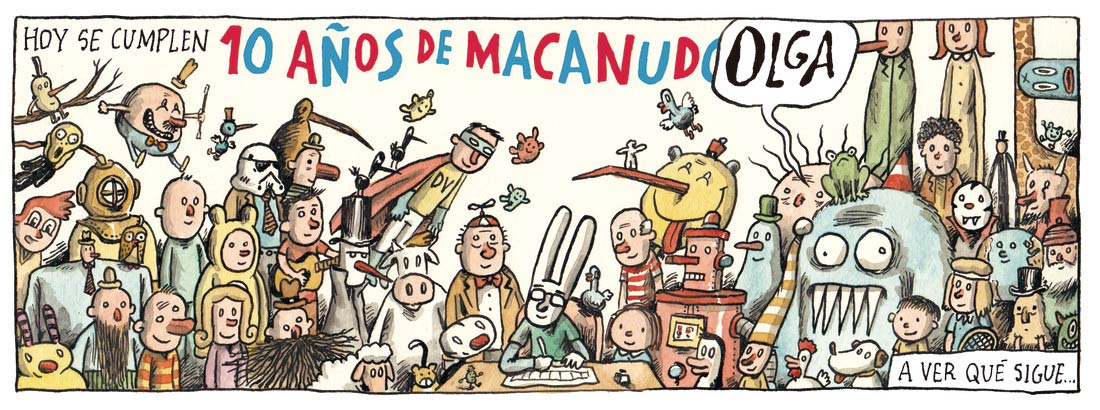Macanudo - 'Enriqueta'. Translation: "When a book is so good that the world dissolves..."
Liniers (Ricardo Siri) is an Argentinian comic artist, whose work has appeared in several South American publications, but also in the USA. His best known creation is the playful and experimental comic strip 'Macanudo', which runs in the daily newspaper La Nación since 2002.
Early life
Ricardo Liniers Siri was born in 1973 in Buenos Aires as the son of a lawyer. He inherited his artistic side from his mother, who made paintings. Liniers liked drawing from an early age and often drew comics about films that left an impression on him, like 'Star Wars'. As a way to be able to re-experience these pictures he made his own comic book adaptations. Among his graphic influences were Latin-American comics legends like Quino, Héctor Germán Oesterheld and Francisco Solano López, but also more international inspirations like George Herriman, Charles M. Schulz, Hergé, René Goscinny and Albert Uderzo. Liniers initially tried to follow the family tradition and become a lawyer, then studied communication and advertising, but eventually settled as a comic artist.
'Bonjour'. Translation: "That was fabulous." - "Pero, why don't you take off your hat?" - "Nooo!" - "I use it to cover the man attached to my head." - "Ah, he's super sympathetic! Wanna have a trio?" - "Señor Gomez asked us if he could send us a greeting."
Early comics career
Liniers' work first appeared in fanzines, and then moved to more professional publications from 1997 onwards. Throughout the years, these have included Radar, Lugares, ¡Suélteme!, Hecho en Buenos Aires, Calles, Zona de Obras, Consecuencias, ¡Qué Suerte! and Olho Mágico. He also contributed to international anthologies like Comix 2000 (L'Association, 1999) and Will Eisner's '9-11 Artists Respond' (Dark Horse Comics, 2002).
Bonjour
In September 1999, Liniers created a weekly comic strip named 'Bonjour' (1999-2002), published in NO!, the supplement of the daily newspaper Página/12. This experimental and adult-oriented comic strip came to an end on 27 June 2002, when Liniers began his association with the Argentinian newspaper La Nación through fellow cartoonist Maitena.
Macanudo - 'El Misterioso Hombre de Negro', quoting novelist Ray Bradbury: "Death is mysterious, life even more so."
Macanudo
In 2002, for the newspaper La Nación, Liniers created 'Macanudo', a daily comic strip which gained a wide popularity in and outside of Argentina thanks to its unique sense of humor and colorful cast of characters. Besides a great many penguins, sheep and elves, the strip is populated by a mysterious man in black ("El Misterioso Hombre de Negro"), the girl Enriqueta and her cat Fellini, Alfio, the troglodyte ball, Martincito and his imaginary friend Olga. Cartoonist Liniers himself also appears in the form of an anthropomorphic rabbit, the section 'Las Verdaderas Aventuras de Liniers' ('The True Life of Liniers').
'Macanudo'. Translation: "Light winds from the South East."
The character Enriqueta in 'Macanudo' is regularly seen as a modern-day rendition of Quino's 'Mafalda', although the artist has stated that he would have made her a male if he had known this beforehand. The cartoonist adds multi-layered details in his strip, both in the artwork and the dialogue, while the humor can be described as fresh, intelligent and bizarre. The characters regularly break the fourth wall. Several book collections of both 'Bonjour' and 'Macanudo' have been published by Ediciones de la Flor and the artist's own label La Editorial Común. 'Macanudo' has also ran in the Peruvian newspaper Perú 21, the Brazilian Folha de São Paulo (2010-2011), the Spanish El Periódico de Cataluña (2007-2009).
Macanudo - 'Las Verdaderas Aventuras de Liniers'. Translation: "Daddy drew this joke." - "What a strange taste this little guy has." - "Very good!".
Other comics
Together with Santiago Rial Ungaro Liniers, Liniers created the graphic novel 'Warhol Para Principiantes' ('Warhol for Beginners', Ediciones Era Naciente, 2001), an account of Andy Warhol's life and career. Liniers created a series of travel journals named 'Conejo de Viaje' ('Travelling Rabbit', 2008), which is a graphic account of his personal voyages to France, Germany, Spain, Portugal, Argentina and Antarctica. Here, the artist also drew himself as a rabbit.
'The Big Wet Balloon'. English-language version.
Further activities
Liniers' children's comic book 'El Globo Grande y Mojado' (2013) became his first publication translated into the USA (as 'The Big Wet Balloon, a TOON Book'). He has also illustrated some covers for The New Yorker and illustrated the covers for the musical albums 'Logo' (2007) by Kevin Johansen and 'La Lengua Popular' (2007) by Andrés Calamaro. Liniers also performs as a live painter at Kevin Johansen shows. Liniers has been awarded the Konex
Recognition
In 2007, Liniers received the Gardel Prize for his album cover design of Andrés Calamaro's 'La Lengua Popular'. The cartoonist also won the Konex Award (2012) for being one of Argentina's Best Graphic Humorists of the Decade.
Legacy and influence
In 2022, Fantagraphics released an English translation of 'Macanudo', with a foreword by 'Simpsons' creator Matt Groening. He praised the comic for being "funny, fanciful, whimsical and philosophical in the best sense."









